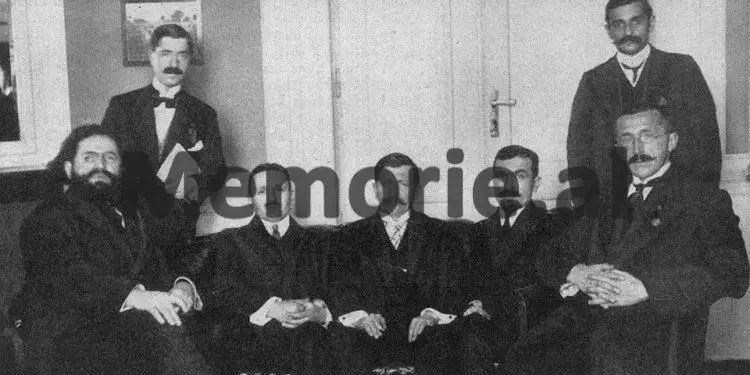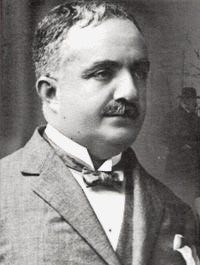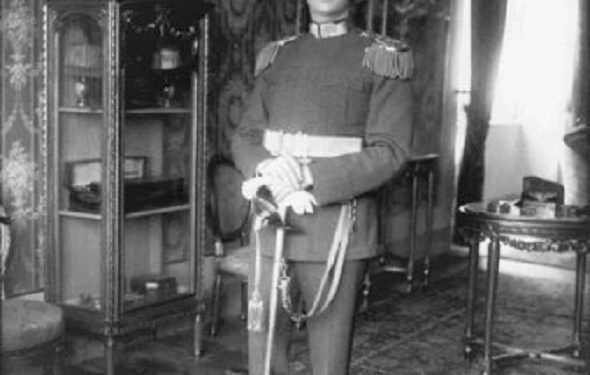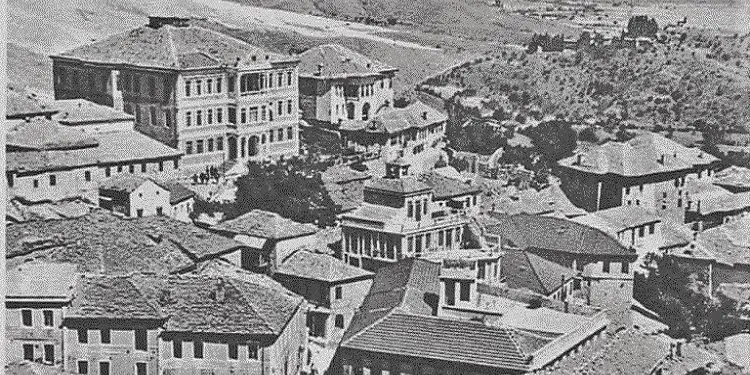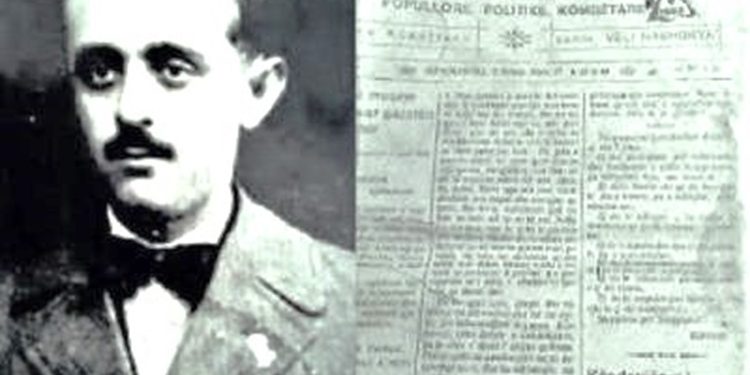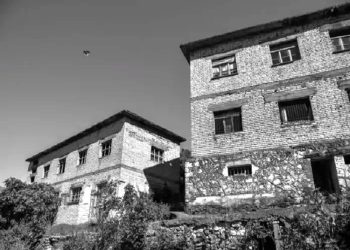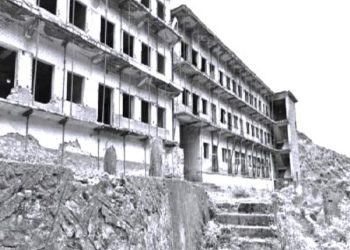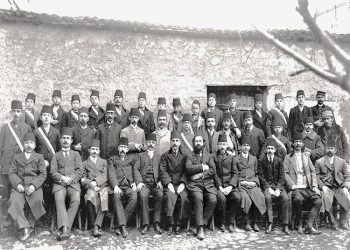By Dr. Dorian Koçi
Part Two
Memorie.al / Modern Albanian journalism has its roots in the cultural humus of the city of Gjirokastra. Within a span of 10 years, 1920-1930, newspapers such as: Veli Hashorva’s “Drita” (published in Gjirokastra on March 27, 1920-1924), Xhevat Kallajxhiu’s “Demokratia” (published in Gjirokastra on November 28, 1925 and continued until 1939), “Labëria” and “Ideja kombëtare” (which were published in the periods when censorship stopped the publication of the newspaper “Demokratia”), “Fletore Popullore e Politike Kombëtare” (published in Gjirokastra for the first time on March 27, 1920-1924), “Fletore popullore” by Petro M. Harito (published in Gjirokastra with two and four pages, on November 3, 1923), “Neoshqiptarizma” and “Përpejkja Shqiptare” by Branko Merxhani were published.
Continued from the previous issue
Veli Hashorva would openly declare his political convictions and journalistic ethics in the first issue of the newspaper “Drita” which, more than a newspaper program, resembles a seven-point political program. Points one, three and seven emphasized the unity of the Albanian people regardless of religion or region, the fight against any behavior that harms national interests and, above all, the last point proclaimed the motto of the new Albanian in the 1920s: “Albania for Albanians”! At the same time, Veli Hashorva, as the first model of the modern Albanian journalist, notes in his program the basic motto of journalism that… “We will speak what we believe to be true, without being shy or taking sides” and point six; “that we will criticize anyone’s work, even if it is not liked”.
Veli Hashorva, as a progressive democrat, sought to undertake social reforms through the pages of the Newspaper “Drita” to strengthen individual human freedoms and stop old and unpopular customs. The Newspaper “Drita” was welcomed in intellectual circles in Albania and the diaspora. Many congratulations were sent to its publisher, who took the initiative in such a difficult situation.
The newspaper “Politika”, by Halim Xhelos, the newspaper “Omonia-Konkordia”, by lawyer Dilos, the newspaper “Kuvendi”, published in Rome, the newspaper “Dielli”, published in America, etc. have written about it. The latter wrote that; “A Light has emerged, a lamp that will show travelers in the fog, the right path to the harbor of salvation. We are sure that ‘Drita’ under the leadership of the patriot Veli Hashorva, will be able to fulfill its sacred purpose and beyond its borders”.
The nationalist program of the Newspaper “Drita” greatly contributed to the nationalist education of its readers. At the same time, this program also contributed greatly to the emancipation of traditional Albanian society, when its pages demanded equal rights for women, equal to those of men, for their education. In this case, he seems to have been a disciple of the thoughts of the ideologist of the National Revival Sami Frashëri, who was highly respected by the Albanian diaspora and students in Istanbul.
In his book “Albania, what it was, what it is and what it will be”, he writes about Albanian women, that the level of culture and education, the spiritual height, the upbringing of Albanian women, of future mothers, who will raise generations of citizens and future leaders of the motherland, is of primary importance for the future of the nation and the family. On March 23, 1921, the “Against Bastille” Society was founded, which included about 100 women and girls. The society drafted a manifesto demanding their respect and progress. Their argument was: “With the progress of women and girls, the Motherland also progresses.” At the head of the Gjirokastra women was the respected teacher Urani Rumbo, who published this manifesto in the pages of the “Drita” newspaper.
The newspaper “Drita” paid special attention to the education of the population and for this it was written on its pages, “we must open many schools, primary and secondary, and have a law on compulsory education”. Veli Hashorva’s younger brother, the well-known teacher and translator Ali Hashorva, under the influence of his brother, would become involved in the educational and democratic movement in Albania. He had completed the “Corso Preparatorio” for teachers, opened by the Italians in Gjirokastra.
Having successfully completed that course, on October 24, 1919, he began his career as a teacher. A distinguished teacher, full of will and vitality, he worked for two years in the schools of the city of Gjirokastra. Thanks to his inclinations, family heritage and cooperation with his brother, Velina, Aliu did not remain alone within the walls of the school, but devotedly entered into social activity, for which the time was so much in need.
When in July 1921, on the initiative of Avni Rustemi, the “Teachers’ League” was created in Gjirokastër, Xhafo Poshi was elected its president, and Ali Hashorva was elected secretary. Time was demanding and Ali Hashorva, intelligent and diligent in his studies, would demand even more of himself. Therefore, with the help of his brother, in August 1921, he went to the Apennines and enrolled in the Arbëresh College of Saint Mitre in Coronë (Calabri), where many other Albanians went, to complete high school.
Veli Hashorva, as secretary of the “Drita” society in Gjirokastër, would be listed among the supporters of the “June 1924 Movement”, and one of the supporters of the Fan Noli government. In two parliamentary elections, in March 1921 and December 27, 1923, the “Drita” society supported the deputies of the liberal democratic groups, mainly against the influence of Myfid Bey Libohova, in the prefecture of Gjirokastra. This antagonism towards Myfid Bey Libohova came as a reminiscence of the pro-Italian positions during the Vlora War, as well as the conservative and traditional spirit that Libohova represented in the Albanian political thought of the time.
The support that Myfid Libohova began to give to Ahmet Zogu, aligning himself with the Progressive Party of the large landowners, would be criticized in the pages of the Drita Newspaper… “The union of Myfid with Ahmet Zogu’s people gives us to understand that all of them have come to an agreement with each other.” Likewise, in this same issue of the Newspaper “Drita”, the “Declaration of the Democratic Group” would be published, which would reflect the electoral program of this important liberal-democratic grouping, regarding the reforms that would be undertaken in Albania. In issues 151 and 152, the Newspaper “Drita” calls for voting for the candidates of the democratic group, marking the names of the candidates in capital letters.
This is precisely the reason that on the occasion of the non-election as a deputy of Myfit Bey Libohova, in the elections of December 27, 1923, the Newspaper “Drita”, while welcoming the victory of the People, wrote that; “with this victory they made the Bey of Libohova understand that Albania belongs to the Albanians and not the fiefdom of him and his friends”! The intensification of the political battle in the elections of December 1923 had also hardened the political discourse in Albania. Myfit Libohova was furiously attacked in the Albanian Parliament, also for illegal actions during the elections (December 1923), proving that his arguments had no logical basis, much less legal.
In the tense situation that followed the period from January 1924, until the assassination of Avni Rustemi, on April 22, 1924, the newspaper “Drita” defended the cause of the opposition and the fight against conservatism, which was now represented in the government of Shevqet Vërlac. On April 20, 1924, at 9:30, the newspaper’s director was notified from Tirana of the wounding of Avni Rustemi. The next day, Gjirokastra gathered for a large rally, where Veli Harshova and Ramiz Harxhi spoke, amidst general sorrow. The people dispersed, venting their anger against Ahmet Zog and Shefqet Vërlac…! Monday and until half of Tuesday passed in silence.
“Drita” notes that; “the bullet had hit Avni in the right arm, between the 7th and 8th ribs, hit his lung and remained above his stomach”. All citizens, members of the democratic society, the “Opingarëve” Club, protest with telegrams addressed to the government and the civil hospital of Tirana, where Avni Rustemi was hospitalized. He spent 48 hours, lying with serious wounds. Veli Harshova in his speech, among other things, said: “Alexander the Great, when he visited the tomb of Achilles, said: Blessed are you, Achilles that you found a Homer, who sang of your bravery”. And about Avni he said: “Instead of finding such a poet to sing of your bravery, a patriot, Ramiz Harxhi, who mourned with a touching poem”.
The “Opingarëve” club in Gjirokastra had turned into a liberal democratic nucleus, which unreservedly supported the opposition of that time, led by Fan Noli. The reaction to the death of Avni Rustemi, throughout the country was harsh, because it was truly a tragedy. The opposition press, which included the “Drita” newspaper, was quick to denounce Zog’s complicity in the murder.
The “Drita” newspaper unreservedly supported Fan Noli’s government, constantly reminding them in its writings of the implementation of the political program, as well as the acceleration of social reforms in the country. The Gjirokastra newspaper “Drita”, in its article of July 2, 1924, “The Government Program”, commenting on and propagating the program of Noli’s Government, especially point five: Abolition of feudalism, liberation of the people and definitive establishment of democracy in Albania, wrote that; “the eradication of feudalism is a fundamental condition for the civilization of Albania”.
However, Fan Noli’s government did not meet the enthusiastic expectations of the opposition press, which had long been demanding deeper social reforms in Albania. Albanians who had come from America and supported Noli, scattered in the regions of Korça, Ersekë, Përmet, Gjirokastër, Kurvelesh and Tepelena, did not yet constitute a majority in Albania.
Noli’s lack of initiative and determination to start with changes did not come so much from the fact that he did not find the support of the cabinet, but from the fact that he was not yet convinced that the backward Albanian society was prepared to undergo serious political and social upheavals. To the latter, was added the reserved attitude and the worrying signals that arrived from abroad. The Great Powers carefully followed the developments in Albania and the actions of the government that had come to power by force.
According to them, the government, before making reforms, should hold elections to legitimize itself. Noli, although he was sensitive to the international stance, still did not pay attention to their demands for the government’s legitimization. But this did not mean that he ignored them. On the contrary, being an experienced diplomat and knowing the mechanisms operating in political circles that directed the destinies of the world, Noli paid great attention to them. In fact, as it turned out later, he would be so concerned about the international recognition of the government that external problems would take up more space in his activity than internal ones.
In its last issue on December 20, 1924, four days before Zog’s entry into Tirana, the editor Veli Hashorva would write: United in the face of danger. The Albanian people, more than ever today, must be united as a single body against their enemies. Only if it is united will it overcome this danger that is threatening our Albania”.
The call of the democratic patriot would not find support in the organization of efficient measures by the government. In Gjirokastra, as well as on the north-eastern borders, the situation was in favor of the Noli Government. Myfit Libohova, a supporter of Zog, had concentrated forces near the borders of Albania and marched towards Gjirokastra on December 24. The people of Gjirokastra were inclined not only against Myfit Bey, but they viewed with great suspicion and were ready to oppose a movement coming from Greece. However, they soon found themselves without any leadership, whether political or military, and the situation here also turned in favor of the counter-revolutionary forces.
The members of the government themselves, led by Fan Noli and a few government forces, withdrew to Vlora. From here, about 300-500 people fled to Italy, while just as many left for Greece. The fall of Fan Noli’s government and the return to power of Ahmet Zogu would also lead to the closure of the “Drita” newspaper. Under these conditions, Veli Hashorva, as an open political opponent of Myfit Bey Libohova, would leave his homeland and emigrate to Turkey, where he would die in 1975. In the 1960s, he sent his memoirs that are preserved in the Hashorva family archive and in the archive of the Institute of History, at the Academy of Albanian Studies.
The newspaper “Drita” as the first newspaper opened in the Albanian language in Gjirokastër, has the special merit of having established in the Albanian public discourse, the anti-imperialist discourse, calling for the organization of the War of Vlora and national unity. The newspaper expressed through an article entitled; “The Power Itself”, that; “We must not sit idly by, every door is closed to us, at every gate we knocked, no one answered us. Now we are left to look at our own plight. This is the only salvation; the only power we should boast of is our own power.
If Albanians will use their power, let us make sure that Albania is saved. Then the world will understand that we are alive and that we live under the shadow of the red and black flag with the two-proud eagle. Wake up, Albanian! It is not too late to work… decide your fate with your own hands and do not wait for a stranger to save you… we can lose Albania forever, if we remain numb, but we will gain our freedom, if we move and show vitality”.
This speech was not anti-Italian, but was in the spirit of the speech expressed by Ali Këlcyra, published in the newspaper “Drita”, where among other things it was stated that… “I had the greatest respect for the freedom-loving Italian people, (but) I was strictly against the Machiavellian policy that Sonino, Nitti, Titoni and the (military) command of Vlora were carrying out in Albania”. It was this stance of the Albanian patriots that made it possible for Italian policy to transform from a policy of bargaining with Albania’s neighbors into a policy of support for the territorial integrity and support of the Albanian state, after the War of Vlora.
Likewise, Gazeta “Drita” turns out to be the first organ of the Albanian press in Gjirokastër, which establishes the modern and democratic discourse against the traditional conservative layers, which still kept Albania as a museum of late feudalism, where human dignity and personality were little valued and the freedoms of the wider layers of the population for education and economic prosperity were trampled.
In this way, Gazeta “Drita” turns out to have been the first school of journalism in Gjirokastër, which paved the way for the opening of other subsequent newspapers, which left their mark on Albanian culture. The publication and editing of all its issues, which are in the National Library, will provide much more information to the Albanian public today, on the beginnings of modernism and the evolution of Albanian society and culture in the 1920s./ Memorie.al





